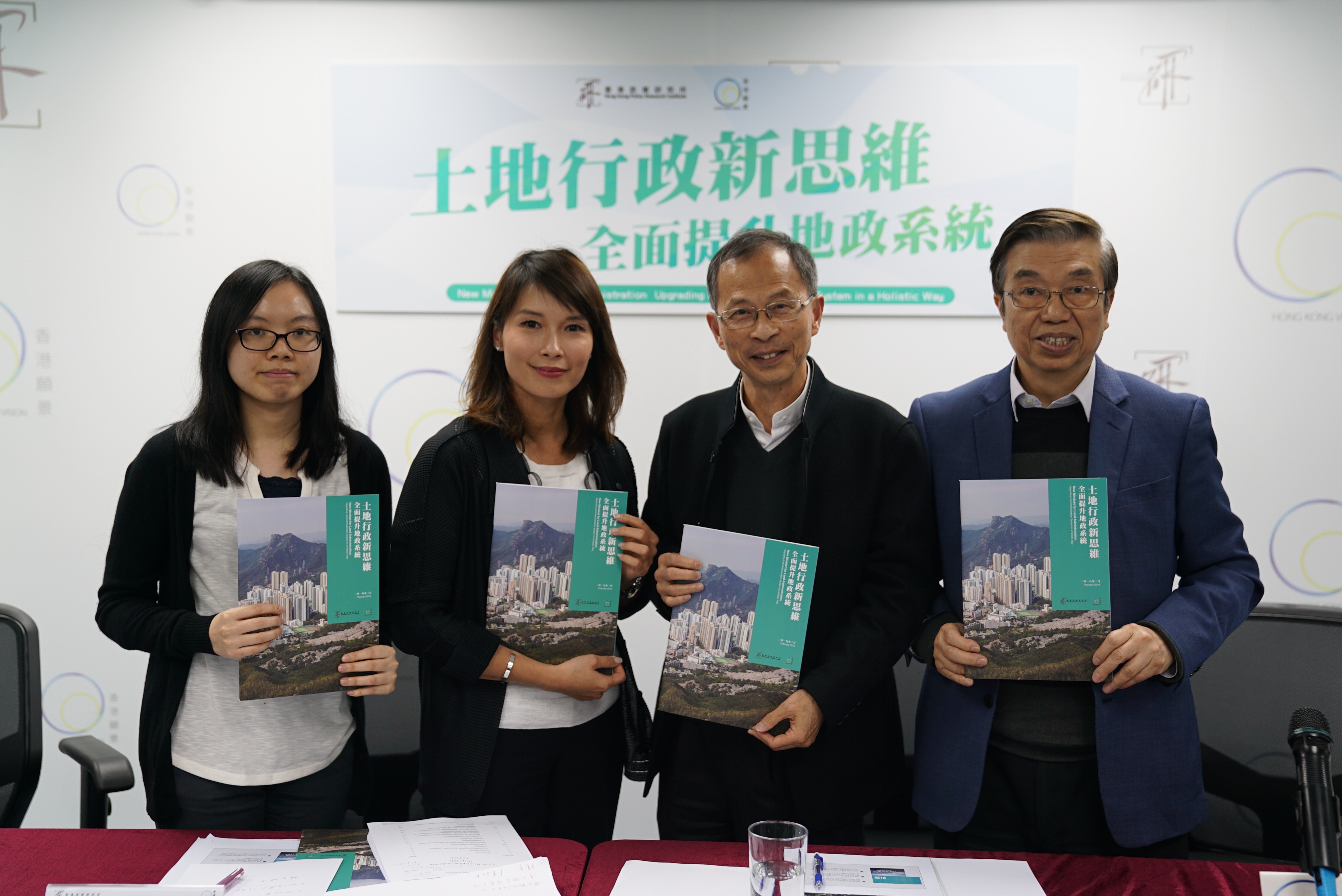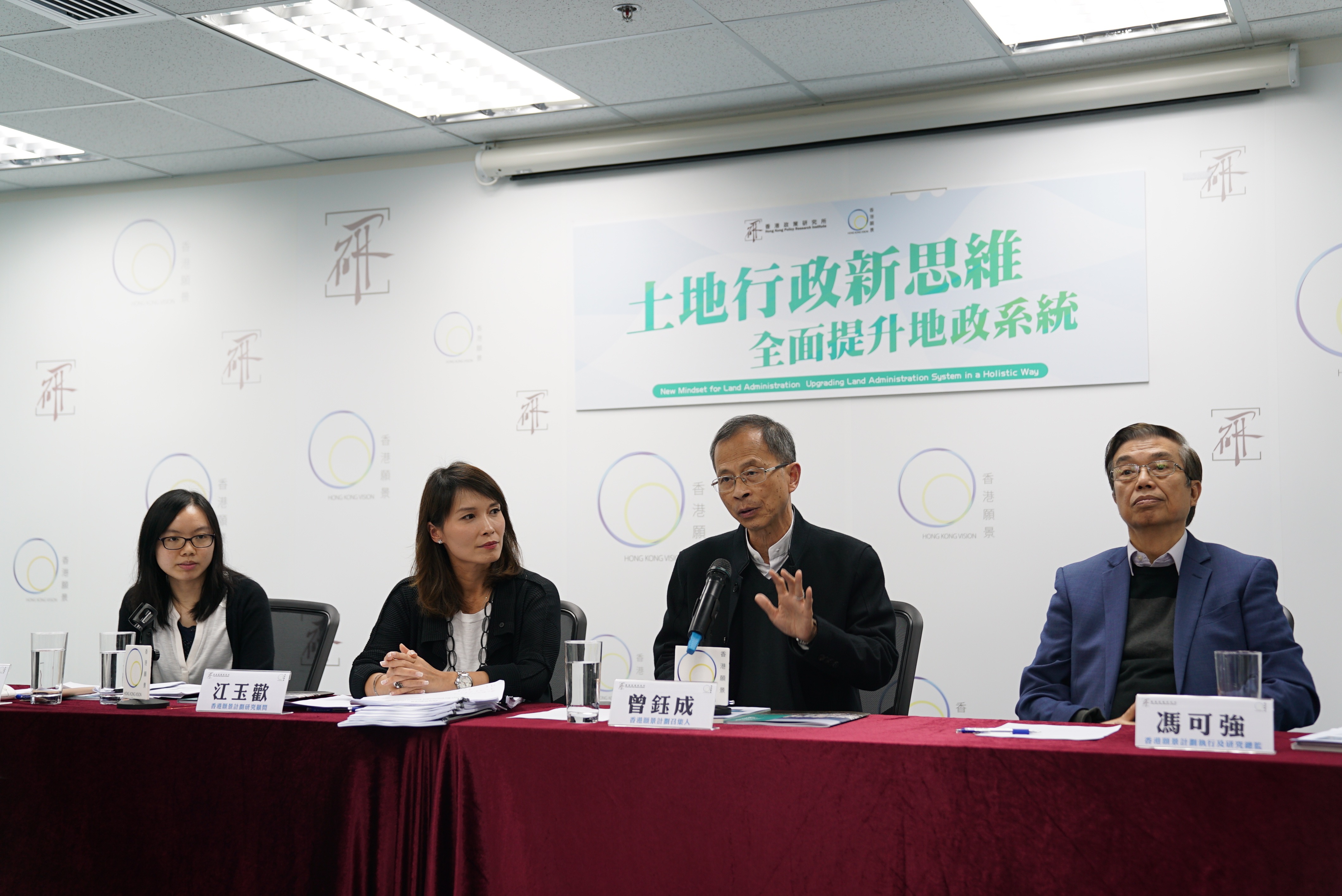
Introduction
Hong Kong is currently facing severe land shortages and housing problems. There is a prevailing public concern on how to increase land supply. However, increasing land supply is only part of the solution for housing shortage. To tackle the issue holistically in the long run, it also requires improvement in and collaboration among urban planning, building regulations and design, land management and administration. Land administration includes the formulation of land policy, legal framework, land resource management, geographic information management and land information integration and releasing. We understand the factors affecting land administration and land supply are numerous and complicated. Apart from land administration, it is undeniable that other factors such as urban planning and construction financing also have far-reaching implications on land supply and housing. Nevertheless, land administration is closely related to long-term land and housing development. Despite an increase in land supply, a lack of a proper land administration system can still leave land vacant and idle. Due to the constraints in resource and time, we will try to focus on land administration system in this report. Land administration covers a wide range of functions including land grants, preparation, execution and modification of land leases, lease enforcements and so on. Land administration is not only an important part of public administration, but has also gradually developed into a professional system overseas and even becomes a critical factor considered by international organisations for assessing the performance of regions/countries. Each function is interconnected to form a unique land administration system. Under the current social needs and international development trend, it is no longer suitable to separately examine and implement the various functions, and it is necessary to consider land administration as a coherent system. With reference to oversea examples, an examination on the land administration of Hong Kong has been conducted and recommendations for Government’s consideration are proposed in five aspects. Through upgrading the land administration system in a holistic way, it is hoped that the pressing land shortage issue could be addressed.
The importance of land administration
According to the European Commission, land is an asset of great importance for a country or city, and land administration is a framework for implementing land policies and an administrative direction for managing land resources. Scholars also pointed out that the objective of land administration is to address land-related issues by establishing an administrative mechanism so as to achieve fair utilisation of land resources and sustainable development. Land administration is closely related to land supply. Without an efficient land administration system to effect land policies, land resources may be idle and misused or fall into uses which are illegal or in breach of lease, leading to a failure to release land with development potential in time. Moreover, if land administration procedure is too complicated or lengthy, it will impede land supply, causing a miss in development opportunities and an increase in the negotiation and construction cost for development. Therefore, land administration plays an important role that cannot be ignored in both people's livelihood and social development.
Land Administration in Hong Kong requires improvements
The major duties of land administration in Hong Kong include (i) land disposal and sale (including land disposal and acquisition,land lease and modification or land exchange and land sales, etc.); (ii) land management (including land registration and geographic information system, etc.); and (iii) lease enforcement.

After 1997, the Executive Council endorsed various provisions covering land leases and related matters, including lease granting and modification, renewing and extending of special purpose leases, non-renewable leases and short term tenancies. Currently the land Department (LandsD) is the main administrative body responsible for land matters in Hong Kong. LandsD comprises three functional offices, namely Survey and Mapping Office, Lands Administration Office and Legal Advisory and Conveyancing Office. The respective offices are further subdivided into different sections responsible for different duties. Meanwhile, the land registration services are provided by the Land Registry, which provides the public with registration and search services and registration of owners' corporations. As different scholars and this report pointed out, it is not easy to establish a set of criteria and indicators for evaluating existing land administration. The World Bank publishes its Doing Business Report every year, which also consists of an assessment on land management. As a reference standard widely applied in about 200 economies around the world, the Report continues to provide benchmark analysis and compares ‘best practices’ within the sector. The Report indicated that Hong Kong’s land administration quality index has scored from 23 to 27.5 (out of 30) from 2016 to 2018, demonstrating that land management system in Hong Kong has been improved continuously. Except for the Land Dispute Resolution Index, Hong Kong has scored the highest marks among all the indicators, including Reliability of Infrastructure Index, Transparency Index, Geographical Coverage Index and Equal Access to Property Index. While the World Bank needs to develop a set of international standards applicable to nearly 200 economies, itis inevitable that detailed and in-depth assessments may not be made for individual economy. The Report assesses land administration system mainly from an economic perspective and considers factors that will influence the business environment. The Report perse is unavoidably tilted and not comprehensive. As a highly cosmopolitan city, Hong Kong’s performance in registering property is ranking the lowest among the 11 indicators that influence the business life cycle, and Hong Kong’s rank is lower than Singapore or Taiwan by more than 25, which clearly implies that improvement in the current system is necessary. It has been pointed out by land administration scholars that relying merely on business environment as the evaluation factor is not sufficient, and that a more comprehensive analysis consisting of other factors is needed, including whether the system can achieve sustainable development, whether there is a holistic approach to land issues, inclusion of all rights, restrictions, responsibilities, good governance and civic participation, introduction of e-government and data integration and inclusion of important spatial data component.
After 1997, the Executive Council endorsed various provisions covering land leases and related matters, including lease granting and modification, renewing and extending of special purpose leases, non-renewable leases and short term tenancies. Currently the land Department (LandsD) is the main administrative body responsible for land matters in Hong Kong. LandsD comprises three functional offices, namely Survey and Mapping Office, Lands Administration Office and Legal Advisory and Conveyancing Office. The respective offices are further subdivided into different sections responsible for different duties. Meanwhile, the land registration services are provided by the Land Registry, which provides the public with registration and search services and registration of owners' corporations. As different scholars and this report pointed out, it is not easy to establish a set of criteria and indicators for evaluating existing land administration. The World Bank publishes its Doing Business Report every year, which also consists of an assessment on land management. As a reference standard widely applied in about 200 economies around the world, the Report continues to provide benchmark analysis and compares ‘best practices’ within the sector. The Report indicated that Hong Kong’s land administration quality index has scored from 23 to 27.5 (out of 30) from 2016 to 2018, demonstrating that land management system in Hong Kong has been improved continuously. Except for the Land Dispute Resolution Index, Hong Kong has scored the highest marks among all the indicators, including Reliability of Infrastructure Index, Transparency Index, Geographical Coverage Index and Equal Access to Property Index. While the World Bank needs to develop a set of international standards applicable to nearly 200 economies, itis inevitable that detailed and in-depth assessments may not be made for individual economy. The Report assesses land administration system mainly from an economic perspective and considers factors that will influence the business environment. The Report perse is unavoidably tilted and not comprehensive. As a highly cosmopolitan city, Hong Kong’s performance in registering property is ranking the lowest among the 11 indicators that influence the business life cycle, and Hong Kong’s rank is lower than Singapore or Taiwan by more than 25, which clearly implies that improvement in the current system is necessary. It has been pointed out by land administration scholars that relying merely on business environment as the evaluation factor is not sufficient, and that a more comprehensive analysis consisting of other factors is needed, including whether the system can achieve sustainable development, whether there is a holistic approach to land issues, inclusion of all rights, restrictions, responsibilities, good governance and civic participation, introduction of e-government and data integration and inclusion of important spatial data component.
With reference to the standards mentioned above, the experience of developers and professionals, as well as personal experience and observations of the general public, it can be concluded that there is much room for improvement in the current land administration system in Hong Kong. The issues include a lack of transparency, openness, reliability and accessibility in information, a fragmented and complicated land administration system, a shortage in manpower, outdated land legislations, potential problems within the existing lease and tenure system, underutilised land, lengthy, inefficient and ineffective lease enforcement, a lack of clear definitions on the breach of lease conditions and a lack of a holistic review of the administrative procedures.
In fact, Hong Kong's land administration policies have a long history that some of the practices are a legacy from the British era. Reform of land administration system in Hong Kong would be a complicated and time-consuming process. Despite the obstacles, we believe it is high time for the Government to take action. As an important tool for implementing land policies, which also affects housing policies, land administration system must be reformed and utilized in collaboration with other disciplines to help tackle land development issues and housing supply shortage.

Recommendations
In addition to addressing land supply, it is believed that the Hong Kong SAR Government should conduct a comprehensive review on the land administration system, and formulate and implement plans for progressive reform. This report proposes the following recommendations in five aspects:
Recommendation (1): Holistic review on and computerising land administration system
The Innovation and Technology Bureau released the ‘Smart City Blueprint for Hong Kong’ in December 2017, proposing to develop the Common Spatial Data Infrastructure (CSDI) by 2023 to establish a set of standards and application formats to standardise the format of all data and increase the diversity of data, such as population, transportation, medical care, etc. Nevertheless, it would take five to six years for detailed study before the official launch of CSDI. Moreover, the Government indicated whether the CSDI would be open for public use will be subject to the overall development strategy after the launch of CSDI. It is thus foreseen that the openness and accessibility of spatial data would not be enhanced in the short term. It is suggested that the Hong Kong Government should incorporate the concept of computerising land administration system into the ‘Smart City Blueprint for Hong Kong’ to promote the importance of the electronic geographic information platform and should conduct a detailed study on the comprehensive reform of the land administration system as soon as possible. The Government can consider developing a ‘one-stop’ electronic system to provide the public with an electronic platform for handling land administration applications and obtaining land information. Such a platform can (i)increase accuracy and improve service quality; (ii) expedite the approval process to tap development opportunities; and (iii)standardise information data to increase security and accountability. It can also be developed in the short term. In addition, it is also proposed in the ‘Smart City Blueprint for Hong Kong’ to provide all residents, by 2020, a free electronic identity (eID) which is a single digital identity for authentication when conducting government and commercial transactions online. It is recommended that the Government can provide the public with a comprehensive data platform in the medium term to carry out all land related applications with the eID, which is to reduce misunderstandings and defects, enhance administrative efficiency and expedite land development.
Recommendation (2): Systematic allocation of manpower and training of talent
Over the past decade, the number of positions created by the LandsD has increased from 3,742 in 2008 to 4,116 in2017, accounting an increase of 374 positions (approximately 10%). Despite the increase in positions, LandsD is still facing manpower shortage. This reflects that the Government, apart from continuing to deploy more manpower to land administration duties, should also properly plan and allocate manpower in the long run to prepare for the continuous challenges of land supply and development. It is suggested that the Government should review the detailed manpower allocation of land administration matters and examine whether the manpower and qualification requirements are sufficient to meet the long-term needs of Hong Kong. It is also important to plan the required resources for specific duty in an early stage. It is recommended to establish a set of standardised and universal duty arrangement guidelines, assigning suitable personnel to a specific position for enhancing efficiency and effectiveness. On the other hand, the Government should strengthen talents nurturing and devote resources to encourage tertiary institutes to offer programmes covering land administration or land management for training local calibre in response to Hong Kong’s unique characteristics.
Recommendation (3): Holistic review on land-related ordinances
There are a number of ordinances relating to land matters in Hong Kong covering land auctions, acquisition, resumption,surveying, adjudication, Government rent, taxation and so on. Some of these have not been reviewed and revised for years. For example, the Government Rights (Re-entry and Vesting Remedies) Ordinance (Cap. 126) is related to re-entry of land which is in breach of the lease, and has not been reviewed for nearly 20 years. The fees payable for a licence to occupy Government land as stipulated by Land (Miscellaneous Provisions) Regulations (Cap. 28A) remain at the price level as in the 1970s and are obsolete comparing with the current market price. In addition, the Land Titles Ordinance(Cap. 585) was passed in 2004 but has not yet been implemented. If the ordinance were to be implemented today, it would have been very likely that it would require a further examination on the applicability of the passed ordinance to the present circumstances and whether an update would be necessary. This would further postpone the actual implementation of the ordinance. Although some of the ordinances have been amended in recent years, the revisions were mainly textual or in format. The content may be outdated and fail to keep up with the latest social needs. It is recommended the Hong Kong Government to conduct a holistic review of the land-related ordinances and regulations in a timely manner to ensure that the legislation is in line with the Government's policy objectives, to plug the loopholes of the legislation, to secure the land and property of the public and the Government and to utilise valuable land resources in a more effective manner.
Recommendation (4): Streamlining development procedure and enhancing efficiency
The duties of LandsD are complex and the department’s management efficiency has long been criticized. The Audit Commission has advised LandsD to improve its efficiency on several occasions. With respect to the Land Registry, one of the Audit Commission’s reports has mentioned that the three New Territories Search Offices (NTSOs) have low service demand and continuous operating deficits. In view of the low efficiency and service quality of land administration bodies, the following reasons have been concluded, namely (i) insufficient resources; (ii) outdated and time-consuming procedures without constant review and update; (iii) a lack of accountability and transparency, and failing to address public concerns; and (iv) the internal management of the departments failed to tie in with urban developments.
The present complicated land administration procedures and practices have confused the public and denied their checks and scrutiny on relevant department’s duties and efficiency. Since 1997, there have been eight policy addresses which proposed to expedite and streamline land administration procedures. Nevertheless, none of them has provided specific implementation measures and gained the public’s faith. Therefore, it is important to have a set of coherent and clear guidelines designed for different stakeholders. Current delays or misunderstandings in the land administration processes are often the results of the fragmented and complicated land administration system. The Government indicated in the Policy Address 2018 that the Development Bureau (DEVB) has set up a steering group to explore ways to streamline the process of development approval for departments under its purview. We support the steering group to continue to study the streamlining and improvement of the approval of development project to further improve the existing departmental collaboration and coordination. On the other hand, the Land and DevelopmentAdvisory Committee (LDAC) would advise the Government on matters relating to planning, land and buildings. It is recommended that the transparency of the information of the steering group and the LDAC should be enhanced to keep the public informed on the study and its progress.
Recommendation (5): Establishing more open and transparent land policies and land administration system
The process of formulating public policies in Hong Kong is often not open and transparent. For example, the Government has not disclosed the information on idle Government or private land. In addition, the calculation of land premium also reflects that Government information is not transparent. The LandsD has only briefly stated that calculation of premium is based on the difference between the full market value of the relevant site under the original lease conditions as compared with that under the proposed new conditions. The general public would by no means get to know the detailed procedures for the calculation of the land premium. It is impossible for the public to evaluate whether the final land premium amount is reasonable. The Government should strive to enhance the transparency of the land policy and the public’s understanding on the issue. This will effectively reduce disputes and suspicions among stakeholders and avoid politicization of the issues. Apart from this, it is also necessary to enhance the transparency and user-friendliness of the land administration system which supports the implementation of the land policy. For example, more open data on land resources should be added to the LandsD’s website and geographical information map. The Government should also disclose controversial information such as the detailed distribution of idle land and the detailed calculation measures of land premium to the general public. The Government should also consider incorporating the upgrading of the geographic information system into the ‘SmartCity Blueprint for Hong Kong’ as the first step and gradually improving the openness and transparency of the entire land administration system.
Conclusion
Facing the tight land resources in Hong Kong, the increasing demand for more housing and public facilities by the community, as well as the failure to respond to the challenges arising from rapid economic and social development with sufficient land supply, the current SAR Government is striving to find a multi-pronged land supply proposal. However, we believe that increasing land supply is not the only solution. As the options for increasing land supply, such as reclamation and development of caverns and underground spaces, often require huge investment in money and time, the Government needs to actively explore ways to make good use of existing land resources and make the best use of them. In the past few decades, people in Hong Kong have laid much emphasis on land development and ownership issues. Land and property investment have also been a hot topic for public discussion. However, land administration, as a great support for facilitating good land resource management, has received little attention. This report aims to examine HongKong's land administrative structure and system in an easily understandable manner and propose feasible recommendations and development directions. It is hoped that the Government can seize the opportunity to comprehensively reform the land administration system in Hong Kong. We believe that an immediate detailed study on land administration system will help enhancing the existing system, maximising the potential of land resources and effectively expediting development in Hong Kong.




